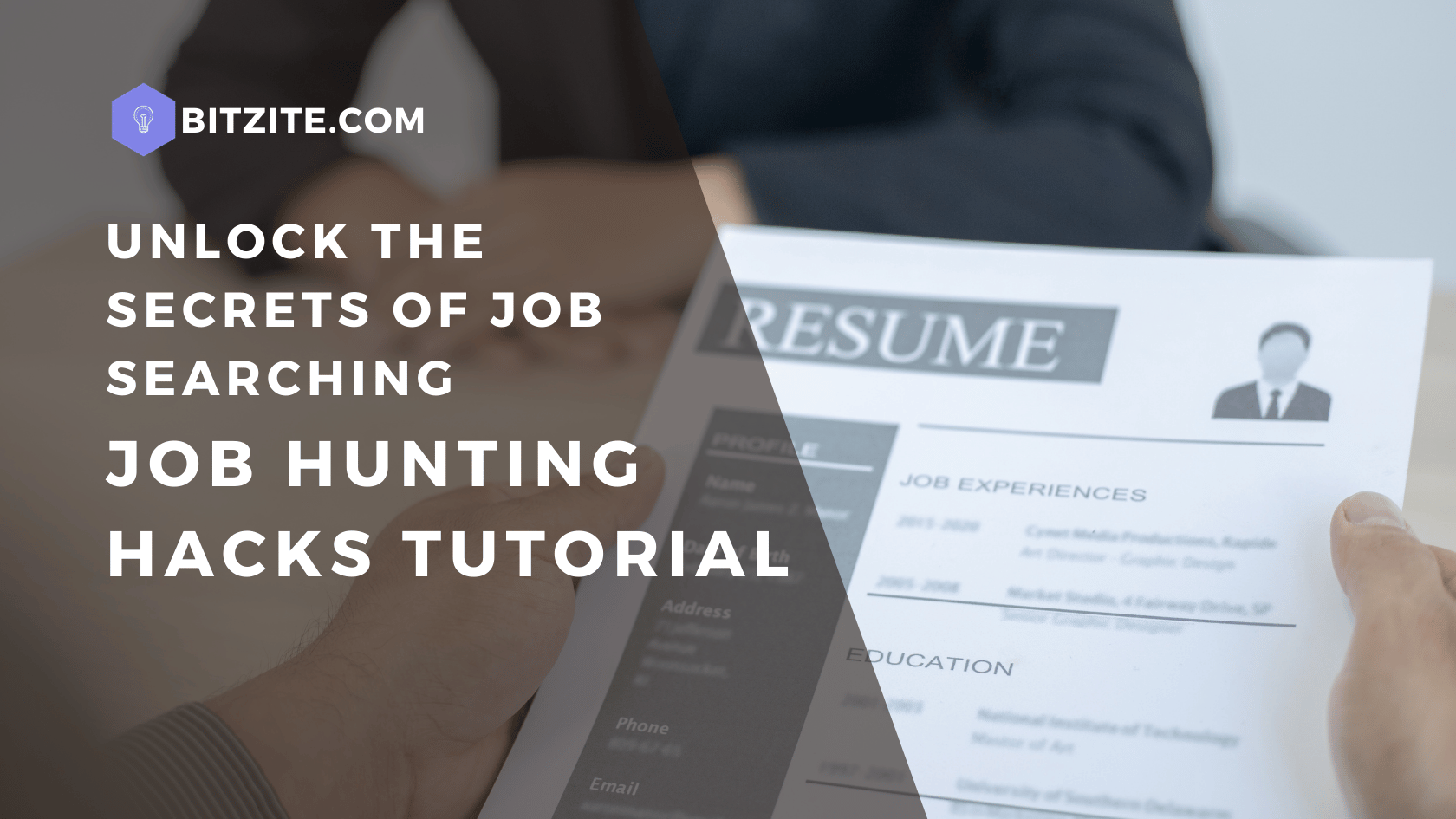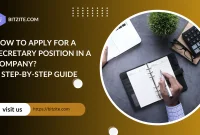Introduction
Welcome to the in-depth guide designed to overhaul your job search process. In the ever-evolving job market, it’s crucial to stay ahead of the curve and employ cutting-edge techniques that make you stand out. Whether you’re a fresh graduate or a seasoned professional, the strategies in this Job Hunting Hacks Tutorial will upgrade your approach and give you an edge over the competition.
Embarking on a job hunt can be daunting. With thousands of candidates vying for the same positions, it’s imperative to have a game plan that is both effective and efficient. That’s where our job hunting hacks come into play. In this tutorial, we will dissect the process into manageable steps, providing you with actionable advice backed by industry insights.
From tailoring your resume for maximum impact to acing interview questions with confidence, we’ve got you covered. So, let’s get started and turn your job search from a chore into an exciting journey towards your dream career.
Understanding the Basics of Job Hunting
What is Job Hunting?
At its core, job hunting is the process of exploring and applying to opportunities that match your skills, interests, and career goals. It is a critical activity for anyone looking to secure employment or advance in their career. This process involves various steps from identifying potential job openings, refining resumes, preparing for interviews, and negotiating job offers.
The Evolution of Job Searching
Over the years, the methods of job hunting have undergone significant transformation mainly due to advancements in technology and the internet. Traditionally, job searches were confined to newspaper classifieds, cold calls, and walk-in interviews. However, the digital age introduced tools such as online job boards, career websites, and social networking platforms like LinkedIn, vastly expanding the reach and efficiency of job search strategies.
Modern job hunters now have access to a plethora of digital resources, including:
- Online Job Boards such as Indeed and Monster
- Professional Networks like LinkedIn
- Company Websites where businesses post vacancies in their careers section
These channels have made it easier for job seekers to discover and apply for job openings across the globe.
Preparing for Your Job Search
Preparation is the first and most critical step in a successful job hunt. Here are some essential preparation steps:
- Setting Clear Career Goals:
- Define what your ideal job looks like to steer your job hunting efforts better.
- Consider factors like job role, industry, company culture, and geographical location.
- Understanding Your Skills and Weaknesses:
- Conduct a self-assessment to identify your strengths and areas for improvement.
- This understanding will guide you in tailoring your resume and preparing for interviews where you can highlight your skills and address potential weaknesses.
Effective job hunting starts with a robust foundation in understanding the basics, preparing thoughtfully, and adapting to the modern, digital-driven market. With this groundwork laid, you’re better positioned to dive into the more tactical aspects of job hunting, such as crafting compelling application documents.
Crafting the Perfect Resume and Cover Letter
Resume Writing Hacks
Creating a resume that stands out is more art than science. Here are the tips to turn your resume into a compelling narrative of your professional journey.
- Tailoring Your Resume for Each Job: One-size-fits-all doesn’t work in the job application world. Customize your resume for each job by emphasizing the skills and experiences that are most relevant to the job description. Utilize the job keywords to beat the ATS (Applicant Tracking Systems) and make it to the human review.
- Highlighting Achievements Over Duties: Quantify your accomplishments rather than just listing your job duties. For instance, “Increased sales by 30% within six months” is more impactful than “Responsible for handling sales.”
Cover Letter Strategies
While the resume provides a professional overview, the cover stated how your experience is pertinent to the role you’re applying for.
- Creating a Compelling Narrative: Your cover letter should tell a story that your resume can’t. Explain why you’re passionate about the job and how your skills will help you succeed in it. Make it engaging and person-centered to connect with the recruiter.
- How to Address the Hiring Manager: Always try to address the cover letter to a specific person. Research to find the name of the hiring manager or the head:: of the department. Personal touches can make a significant difference.
The Role of Keywords in Your Resume and Cover Table
- Identifying Job-Specific Keywords: Review the job description and note the skills and terms that appear frequently. These are likely what the recruiters are looking for.
- **Implementing SEO in Your Job Heart’n’ties abound in digital job hunting methods, incorporating keywords strategically in your resume and cover letter will increase your visibility and the likelihood that your application will be reviewed by a human.
What Does an Optimized CV Look Like?
Here’s a quick example to show you how to structure a section:
Experience:
Digital Marketing Coordinator | ABC Corp | May 2019 – Present
- Launched a digital campaign that increased website traffic by 40% in 6 months using targeted strategies such as SEO and content marketing.
- Led a team of 5 in developing an international social media presence, resulting in a 50% increase in global engagement.
This approach is concise, achievements-focused, and integrated with relevant keywords, making your application both compelling and optimized for digital sorting systems.
By meticulously crafting each element of your resume and cover letter, you position yourself as the ideal candidate who not only has the required qualifications but also a professional polish that stands out in a crowded job market.
Leveraging Online Platforms for Job Hunting
In today’s digital age, online platforms play a pivotal role in the job search process. Knowing how to effectively use these tools can significantly increase your chances of finding your dream job. Here’s how to navigate these resources:
1. Maximizing LinkedIn
- Optimize Your Profile: Ensure your LinkedIn profile is complete, with a professional photo, a compelling headline, and a detailed summary. Use keywords related to your industry and the roles you seek for better visibility.
- Networking: Connect with industry professionals, alumni, and colleagues. Personalized messages go a long way in building meaningful connections. Engage with content by liking, commenting, and sharing to become more visible on the platform.
- Use LinkedIn Jobs: Leverage LinkedIn’s job search feature to find opportunities matched to your profile and preferences. Apply filters for a more targeted job hunt and set up job alerts for new postings.
2. Exploring Niche Job Boards and Websites
Aside from popular job boards like Indeed and Monster, look for niche job boards specific to your industry. These are goldmines for specialized positions and often have fewer applicants. Examples include AngelList for startups, Stack Overflow for tech jobs, or Behance for creative roles.
3. Company Websites and Career Pages
Many companies post job openings on their own websites before listing them elsewhere. Regularly visiting your dream companies’ career pages can give you a head start on applications. Additionally, making direct applications can sometimes be more effective than going through job boards.
4. Social Media Job Hunting
Platforms like Twitter and Facebook also host job hunt opportunities. Follow industry leaders and companies for potential job alerts. Joining relevant groups or forums can open doors to vacancies shared within these communities.
5. Harnessing the Power of Job Alert Emails
Most job boards and company websites allow you to set up job alert emails based on your preferences. This automated service ensures you’re among the first to know when new openings are posted, allowing for timely applications.
Tips for Managing Online Applications
- Keep Track: Maintain an organized system (like a spreadsheet) to track the jobs you’ve applied to, including dates, follow-up actions, and any responses. This helps in managing applications across various platforms.
- Personalize Your Approach: Personalization is key in standing out. Tailor your resume, cover letter, and even emails to the specific job and company to which you are applying.
- Practice Online Etiquette: In all your interactions, maintain professionalism. Whether commenting on a LinkedIn post or emailing a hiring manager, your communication style can make an impression.
By strategically leveraging online platforms and following these tips, you can enhance your visibility to employers, connect with key industry players, and uncover more opportunities that align with your career goals.
Interview Preparation and Final Touches for Job Hunting Success
Once you’ve utilized online platforms for job hunting and have started landing interviews, the right preparation can make the difference between receiving an offer and continuing the search. Here are the key areas to focus on:
Preparing for the Interview
- Research the Company: Learn as much as you can about the company’s culture, products, and recent achievements. This will help you answer questions like “Why do you want to work with us?” with genuine enthusiasm and insight.
- Understand the Job Description: Review the role’s requirements and think of examples from your experience that demonstrate you have the skills and knowledge needed.
- Practice Common Interview Questions: Prepare answers for commonly asked interview questions and practice speaking them out loud. Questions often include topics around your strengths, weaknesses, career goals, and past work experiences.
- Prepare Your Own Questions: Have a list of questions ready to ask the interviewer. This shows that you’re proactive and truly interested in the role and the company.
What to Wear
- Dress for Success: Choose an outfit that is professional and suited for the company you are interviewing with. If in doubt, it’s usually better to be slightly overdressed than underdressed.
Day of the Interview
- Get Plenty of Rest: Ensure you are well-rested before the interview day so that you can be alert and focused.
- Plan Your Route: If the interview is in-person, know exactly where you’re going and how long it takes to get there. Arrive early to allow yourself some buffer time.
- Bring Necessary Materials: Have extra copies of your resume, a list of references, and a notebook and pen handy, even if the interview is digital.
During the Interview
- Body Language: Offer a firm handshake, make eye contact, and sit up straight—these nonverbal cues can convey confidence and professionalism.
- Listen Carefully: Active listening shows the interviewer that you are fully engaged and capable of processing information effectively.
- Answer Clearly and Concisely: Provide clear, concise, and structured answers. It’s okay to pause and think before responding.
After the Interview
- Send a Thank You Note: Follow up with a personalized thank you email to express your appreciation for the opportunity to interview. This should be done within 24 hours of the interview.
- Reflect: Self-reflect on your performance and take notes on what you did well and what you could improve on for the next interview.
Additional Tips:
- Use the STAR Method: When answering behavioral interview questions, structure your responses in the Situation, Task, Action, Result (STAR) format to create a storytelling flow.
- Be Yourself: While it’s important to be professional, don’t forget to let your personality shine through. Cultural fit is just as important as skills for many employers.
- Stay Positive: No matter how an interview goes, stay positive and don’t get discouraged—each interview is a learning opportunity.
By thoroughly preparing and presenting yourself in the best way possible, you maximize your chances of success in the job interviews. Remember, even if it doesn’t result in a job offer, every interview is an opportunity to improve and get one step closer to your ideal position.

